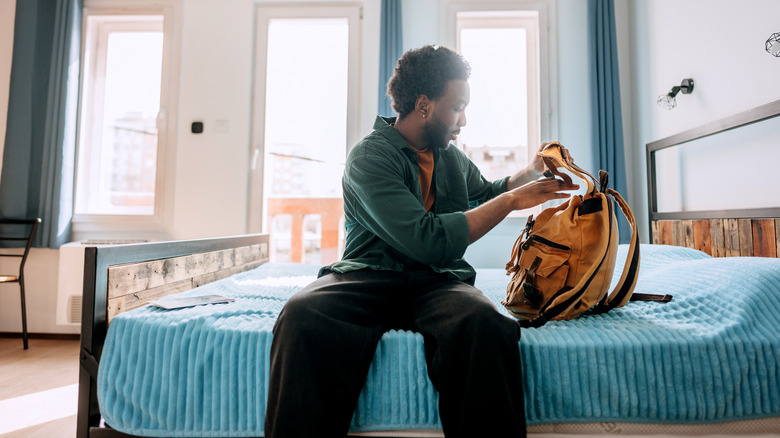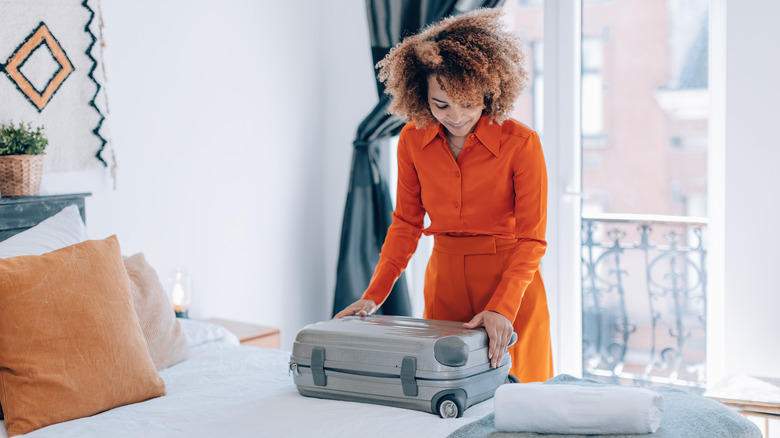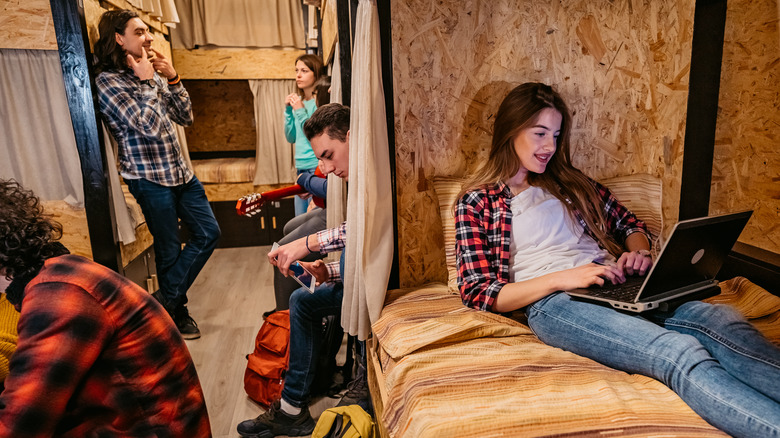Rick Steves' Clever Tips To Find The Best Value For Lodging While On A Solo Trip
Traveling alone can be a freeing experience. You don't have anyone else's needs to consider. You can get up early or sleep in, eat whenever you're hungry, and see and do only the things you want to. Of course, there are some downsides, one of which is that it can be difficult to find accommodation within your budget. Travel expert Rick Steves says on his website that it can actually cost you more. He explains, "Rarely is a single room just half the price of a double. If a double room costs $100, a single room will generally be about $80 — making your stay $30 more expensive each night than if you were sharing the room and the cost." However, Steves has a number of ideas, including looking at specific comparison travel sites like Booking.com and Hotels.com, which often have accommodations for those traveling alone.
That isn't the only way a solo traveler can find the right landing pad for themselves. There are other options like rentals, bed and breakfasts, and hostels to explore. Here's all the info you need before venturing out on a trip alone with lodging that won't break the bank.
Finding hotels and rentals for solo travelers
As Steves says, looking at comparison websites for solo traveler's lodgings is a great idea, but he goes further, suggesting that you find the best room on the site, and then call the hotel directly to book through them. You have the option, of course, to book the room for two travelers for safety reasons, though as we've mentioned, it can cost you more. If you don't do that, one simple trick to feel safer when staying alone in a hotel is to ask the front desk to write down the room number rather than say it out loud, and ask for two keys. Bring a couple of portable door locks, which is one item every solo traveler should carry, for a bit of extra security, and keep the do not disturb sign on the door.
Steves has more options for you. "Other alternatives include home-sharing services such as Airbnb and Servas. Here you can find affordable accommodations ranging from a city dweller's sofa to a guest bedroom in a farmhouse to a studio apartment all your own." He mentions that Servas is more about having hosts and tourists meeting up "for cultural exchange and camaraderie." After all, one of the reasons you may be traveling alone in the first place is to meet new people and explore different cultures. The same goes for a bed and breakfast, where you'll likely have a communal guest breakfast and you'll be able to chat with the hosts.
Staying in a hostel
If meeting new people sounds like fun, another option for solo travelers is a hostel. It's a style of accommodation for those with a tight budget that offers the potential for a wonderful cultural exchange. Steves says, "If you stay in hostels, you'll have a built-in family (plenty of hostels are comfortable and welcoming to people of all ages)." Hostels are usually less expensive than hotels, though you may be sleeping in a dorm-style room, some with bunk beds. Others allow you to spend a bit more for a private room. Many have kitchens, which can save you money on food.
Not only that, but you might find some traveling companions. Steves says, "Hostels come with an instant circle of potential new friends from around the world, making it easy to find companions for dinner or sightseeing." There may be talking late into the night, but what a wonderful thing to experience. He does say that if you find one through Hosteling International (HI), it's more focused on rules, but will be clean and organized. Independent ones are often, he says, "more easygoing and colorful (or chaotic and ramshackle, depending on the place)."
A few things to note: Most hostel dorms are mix-gender, but businesses usually offer female-only rooms as well. You'll likely be sharing a bathroom, but you may also have access to laundry rooms. Make sure to bring a towel, as most hostels don't furnish them. There may be a curfew, so check before you go.


